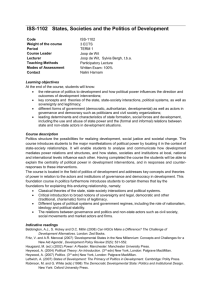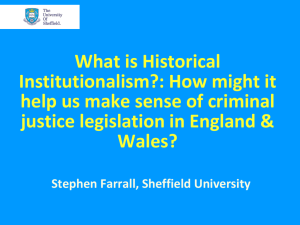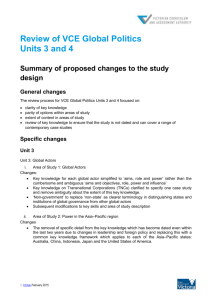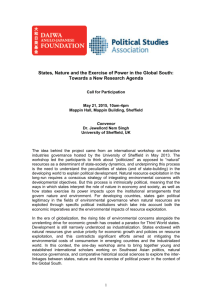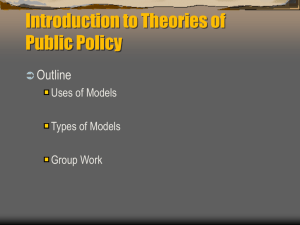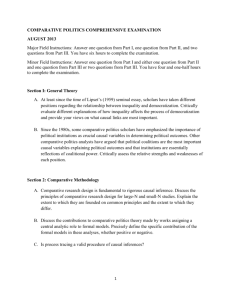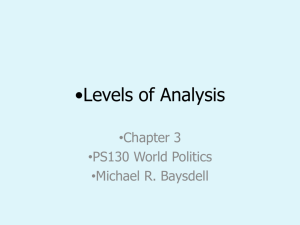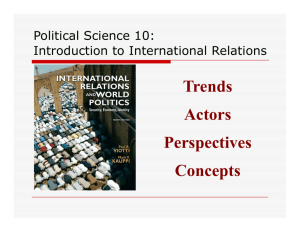What is HI? - University of Sheffield
advertisement
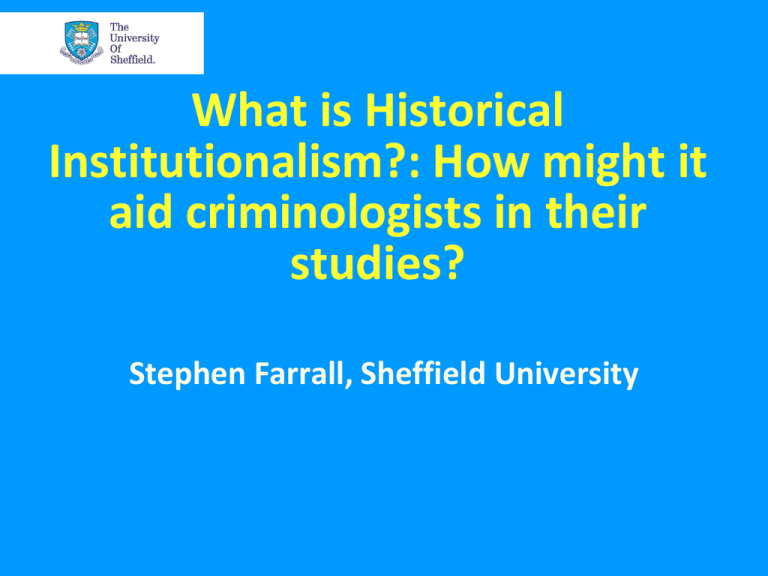
What is Historical Institutionalism?: How might it aid criminologists in their studies? Stephen Farrall, Sheffield University Outline 1: Define and introduce historical institutionalism (HI). 2: Outline some of the main concepts and ideas within HI. 3: Briefly review the sorts of methodologies consistent with HI. 4: Demonstrate it’s applications in our on-going work. 5: Hope to show how ideas from HI can be of use to others. What is HI? • Institutions are: “… the formal rules, compliance procedures, and standard operating practices that structure the relationship between individuals in various units of the policy and economy” (Hall, 1986: 19). • HI is concerned with illuminating how institutions and institutional settings mediate the ways in which processes unfold over time (Thelen and Steinmo, 1992: 2) • “… neither a particular theory nor a specific method. It is best understood as an approach to studying politics. This approach is distinguished from other social science approaches by its attention to real world empirical questions, its historical orientation and its attention to the ways in which institutions structure and shape political behaviour and outcomes.”. Steinmo, 2008. What is HI? • Institutionalists are interested in how institutions are constructed, maintained and adapted over time. • Institutions do not simply channel policies; they help to define policy concerns, create the objects of any policy and shape the nature of the interests in policies which actors may have. • Politics does not simply create policies; policies also create politics. HI is an attempt to develop understanding of how political and policy processes and relationships play out over time coupled with an appreciation that prior events, procedures and processes will have consequences for subsequent events. What are the main concepts within HI? • Path Dependencies: what happened at an earlier point will affect what can happen in the future. Reversal costs are high and institutional arrangements hard to completely ‘undo’. Policy concerns and interests become constructed within certain parameters. • Positive feedback loops: once a set of institutions is in place, actors, organisations and other institutions adapt their activities in ways which reflect and reinforce the path. • Timings and event sequences: both the timing and ordering of events can shape outcomes. • The speed of causal processes and outcomes: there are both fast- and slow-moving causal processes and outcomes (cumulative, threshold and chain causal processes). Last two radically alter the time-frames of our explanations. What are the main concepts within HI? • Critical junctures: those rare and relatively short-lived periods when institutional arrangements are placed on a particular path. During these periods actors may be able to produce significant change. • Punctuated equilibrium: long-run stability in policy-making is subject to occasional seismic shifts when existing institutions and issue definitions break down and pressure for change accumulates to the point where is cannot be ignored. Criticisms: ideas also matter too (not just institutions); too much focus on reproduction of institutions?; focus on political elites (little about the populous); important to remember that not all institutions will be changed/maintained and that the speeds of change may be variable too. Which methodologies are most appropriate? • Initially the focus was on office-holders who shaped politics, processes and policies (so autobiographies, elite interviews, speeches, documents etc). • As well as using these methodologies, one can use any methods which enable one to explore how processes unfold over time. • For our project we use a range of data, both quantitative and qualitative: • autobiographies • officially recorded data • social survey data • coding of Queen’s speeches Using these ideas in our research Exploring Housing Policy Temporal Diagram of Thatcherite Policy Spillover Ends up in CJS change Outline of future work • ESRC grant with Colin Hay, Emily Gray and Will Jennings. 1. Data sets to be made available 2. Training workshop (with UK Data Service) 3. Documentary Film 4. Dissemination events and publications 5. Email list (s.farrall@sheffield.ac.uk) 6. Twittering: Thatcher’s Legacy

